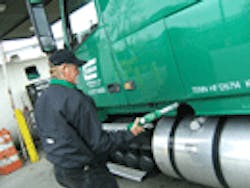Though diesel fuel prices have dropped over the last five weeks and may continue to trend lower in the near-term, they are expected to start climbing back up early next year – thanks to growing uncertainty about global oil prices.
After reaching an average high of $2.674 per gallon in the U.S. during the week of August 31, diesel fuel prices steadily declined to a U.S. average of $2.582 per gallon for the week of October 5. The Energy Information Administration (EIA) predicts that the U.S. average diesel fuel price should end the year around $2.43 per gallon, which would be a 36.1% decline from 2008’s $3.80 per gallon average.
That decline is reflective of the steep falloff in global oil prices from last year along with a significant buildup of distillate supplies in the U.S. from which diesel and gasoline are produced – supplies that are now at their highest level since the 1980s, EIA reported.
Oil prices overall in the U.S. are expected to finish 2009 at $59.90 per barrel, down 39.8% from last year’s average of $99.57 per barrel, according to EIA’s analysis. Yet the agency expects U.S. oil prices to jump 20.9% next year to $72.42 per barrel as sustained economic growth in China and signs of a turnaround in other Asian countries continue to fuel expectations of a global recovery in world oil consumption.
As a result, EIA revised its expectations for world oil consumption upwards by 200,000 barrels per day (bbl/d) for the remainder of 2009 and for 2010, in large part because of the revision to Asian growth. However, EIA has not revised its West Texas Intermediate (WTI) projections – the standard measure of U.S. oil prices – upward because ample oil supplies remain on the market.
“We’re not expecting a significant increase in diesel prices for the remainder of this year based on that fact that distillate stocks are so high,” Tavio Headley, an economist with the American Trucking Assns. (ATA), told FleetOwner. . “But while things are looking better, diesel prices remain a concern for fleet, largely because we’re at the bottom in terms of global oil prices, so there is nowhere to really go but up.”
The EIA data on oil consumption mirrors that concern. Although the agency said global oil consumption declined by 3.2 million bbl/d in the first half of 2009, with preliminary data indicating oil consumption in the third quarter this year declined 1.2 million bbl/d below year-earlier levels, the EIA’s current macroeconomic outlook assumes the world economy will begin to recover at the end of 2009.
As a result, EIA expects world oil consumption to grow in the fourth quarter of 2009 compared with year-earlier levels – the first such growth in five quarters – with world oil consumption growing by 1.1 million bbl/d in 2010.
Here in the U.S., EIA expects the price of WTI crude oil to average about $70 per barrel this winter (from October 2009 to March 2010). That’s a $19 increase over last winter, with average WTI prices predicted to rise gradually to about $75 per barrel by December 2010 as U.S. and world economic conditions improve.
“While the decline in diesel fuel prices has been a huge help to the trucking industry, that relief disappears when the global economy starts to recover, pushing up oil consumption,” ATA’s Headley said. “Longer term, oil prices of $90 to $100 per barrel are far more likely than the pricing we’re experiencing now.”
About the Author
Sean Kilcarr
Editor in Chief
Sean Kilcarr is a former longtime FleetOwner senior editor who wrote for the publication from 2000 to 2018. He served as editor-in-chief from 2017 to 2018.
